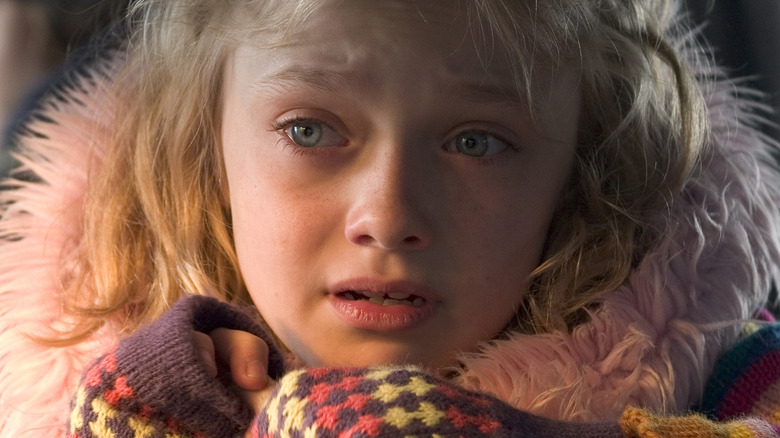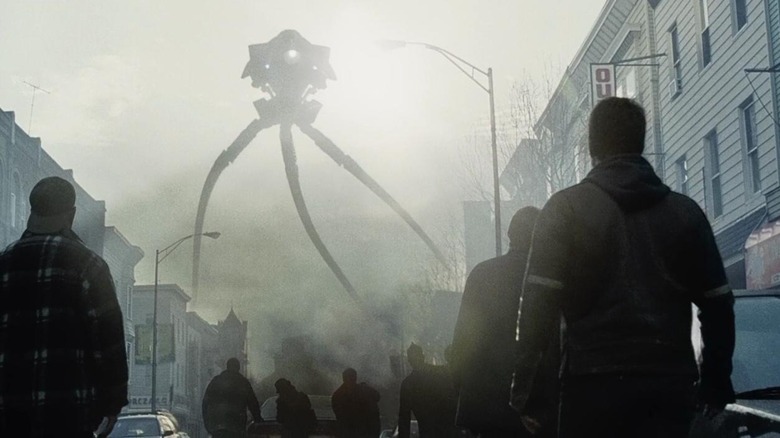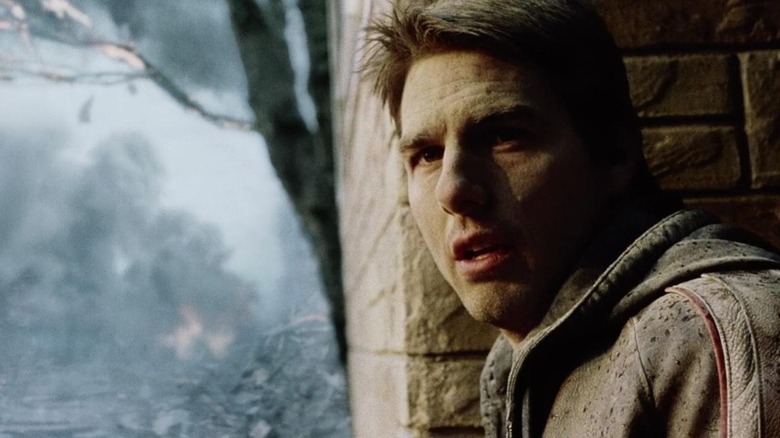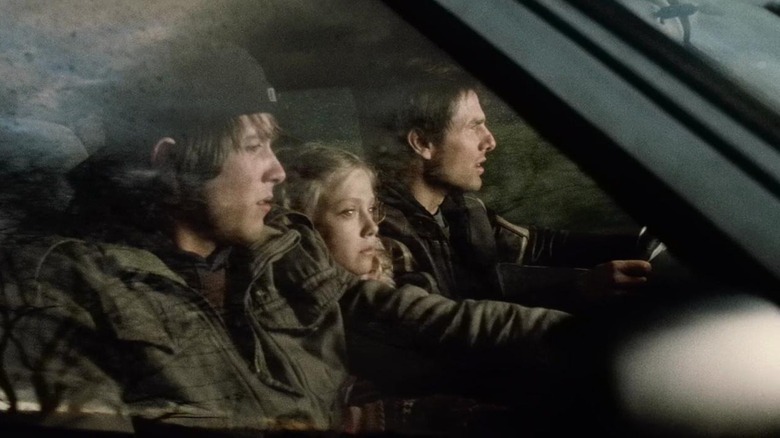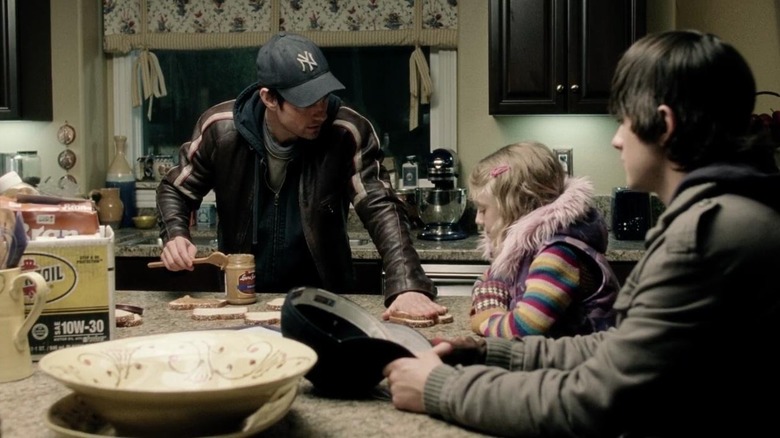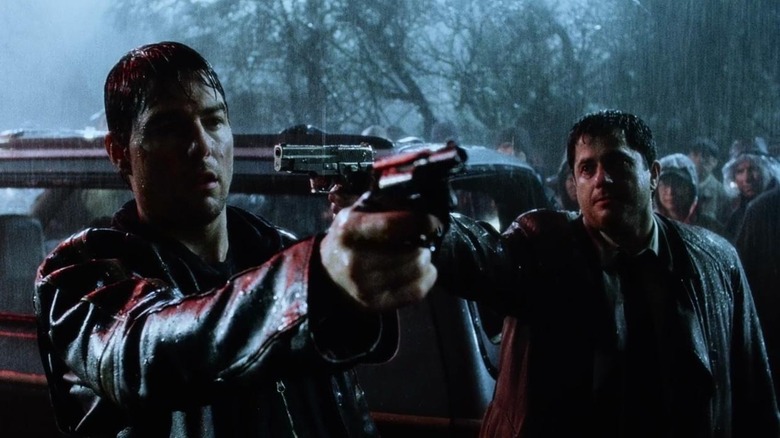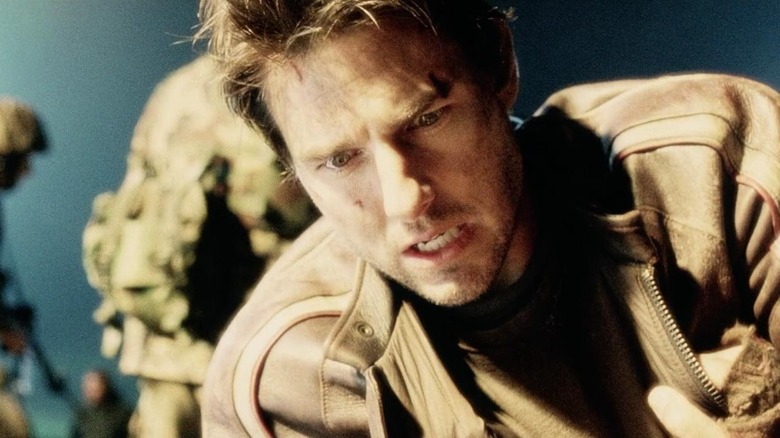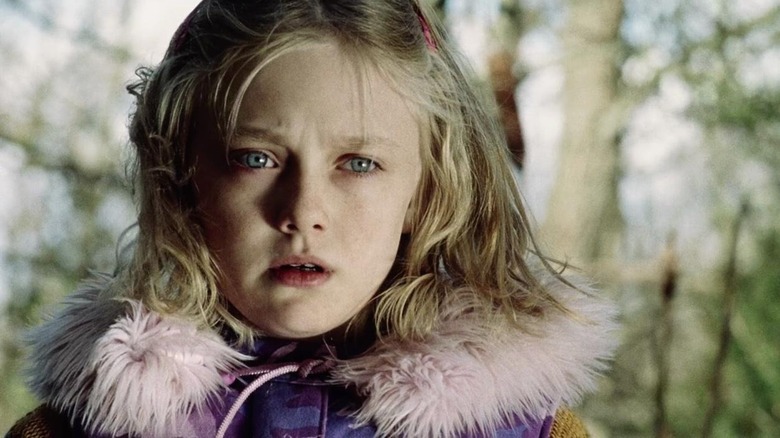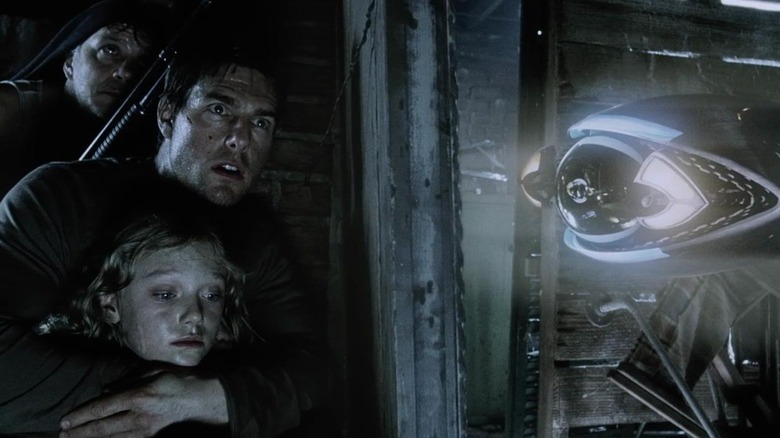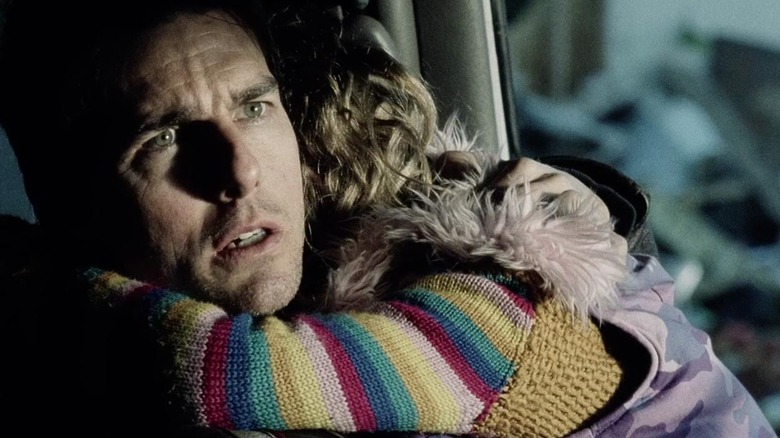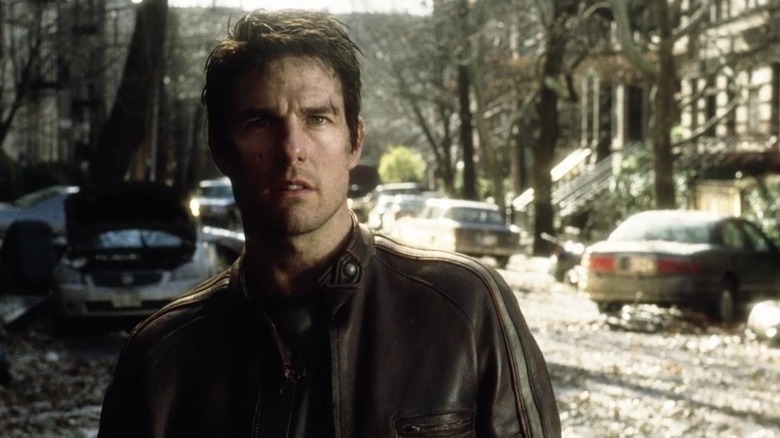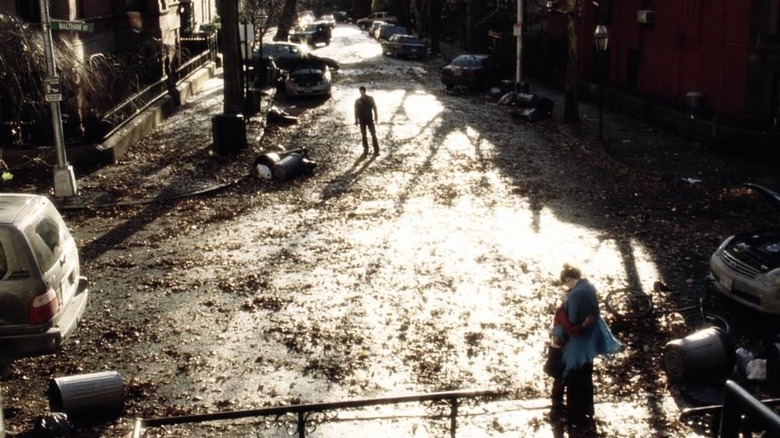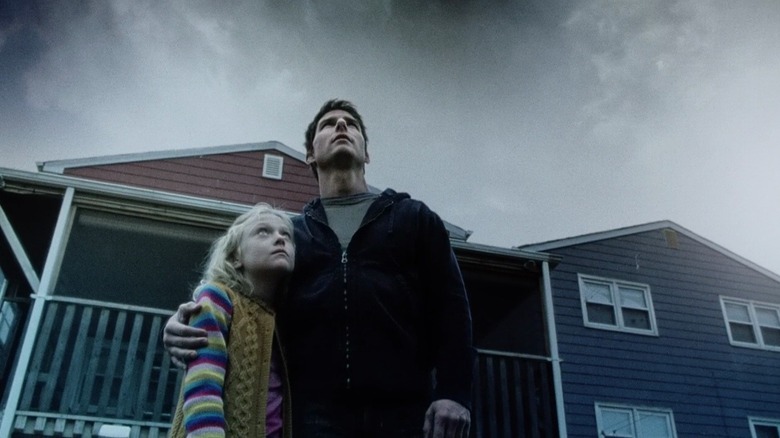The Ending Of 2005's War Of The Worlds Explained
Blockbuster king Steven Spielberg has made dozens of films over the course of his prolific career, so you'd be forgiven for not remembering what happens in every one of them. In 2005, Spielberg released his adaptation of the classic H.G. Wells novel "The War of the Worlds," starring Tom Cruise and a young Dakota Fanning. Though it wasn't totally embraced by critics and is often sidelined by Spielberg's other, more iconic films, it was a box office smash at the time and is definitely worth revisiting.
The film follows Ray (Cruise), a divorced dock worker and dad to two kids, Rachel (Fanning) and Robbie (Justin Chatwin). The kids are staying with Ray for the weekend while their mother (Miranda Otto) is away, and they soon find themselves in the midst of an apocalyptic alien invasion. In classic Spielbergian fashion, the story is as much about family dysfunction as it is about extraterrestrial events. The terrifying action sequences are impeccably done and the performances from both Cruise and Fanning are incredible, but the thing that has stuck with audiences most over the years is the film's divisive ending.
"War of the Worlds" is filled with so much destruction and carnage that, to some, the ending feels like something of a cop-out — but perhaps there's more to that story. What does the ending really mean within the broader context of the narrative? What does it mean for the characters themselves? And how does Spielberg himself feel about it? Keep reading to have all of your questions about the film's ending answered.
Why did the aliens invade earth?
One of the most interesting things about "War of the Worlds" is how much of a departure it is from Spielberg's previous films, especially his previous films about aliens. Think about "E.T.," in which the alien in question is a harmless creature being hunted by greedy humans. Even the aliens in "Close Encounters of the Third Kind," eerie as they are, basically come in peace. That is most certainly not the case in "War of the Worlds," which depicts a very different relationship between humans and aliens.
In The H.G. Wells book, the aliens that invade Earth are known as Martians — meaning they are from Mars, obviously — and numerous details about their species are included. In Spielberg's film, very little is known about the aliens, and they are never actually referred to as Martians. What we do know is that they planted devices called tripods in numerous locations around the globe, likely thousands of years ago. The aliens themselves traveled to Earth (using a lightning storm as a conduit) in order to man the tripods and attack humankind.
We're not given any indications about why the aliens have invaded earth, but it becomes clear that their main goal is colonization and terraformation. They kill most of the humans they come into contact with, but we also learn they need blood and tissue from humans in order to fertilize the extraterrestrial plants they are growing on Earth. The fact that we don't know much about these aliens actually makes them all the more terrifying, and, for most of the film, it seems like nothing will be able to stop them — until something totally unexpected does.
A parable about 9/11
While it's often said that H.G. Wells' 1897 novel was inspired by the horrors of European colonialism, Spielberg's adaptation emerged in a very different landscape. Released four years after 9/11 and two years after the start of the Iraq War, these events clearly influenced the making of the film. The allusions to 9/11 are fairly obvious throughout.
As the tripods begin attacking, they turn people to dust with their lasers. Those who are lucky enough to survive find themselves covered in ash as they scramble around in confusion. People begin putting up signs showing their missing loved ones, another piece of imagery that alludes to real-life events. While the ash falling from the sky and the New York/New Jersey setting make the 9/11 connection clear enough, the threat of terrorism is actually mentioned in the film itself. As Ray and his children flee the city, his daughter Rachel asks him if they're being attacked by terrorists.
It's pretty clear, looking back, how much of the film is a commentary on the aftermath of 9/11, but screenwriter David Koepp was worried that the connection would be too obvious. He told Empire that he considered taking out the "is it the terrorists" line that Dakota Fanning says, but Spielberg told him to keep it in. "No, she's 11, it's 2005, she's going to say that," Spielberg said, according to Koepp. With this parable in mind, "War of the Worlds" becomes a story about how life goes on in the wake of a tragedy like this and the things that are lost in the process.
It's no Independence Day
Spielberg's "War of the Worlds" differs from the typical alien invasion film in some pretty fundamental ways. The main thing that sets it apart from other films of this ilk is the kind of characters it focuses on. Think of "Independence Day," which focuses on how the military and scientists react to the crisis. Even in contemporary monster films like "Godzilla" and "Kong: Skull Island," the main characters are primarily soldiers or scientists. "War of the Worlds" eschews this formula, instead focusing on working-class civilians as they struggle to survive.
This focus on Ray and his family makes the film even more compelling. They have no special skills that would help them have a better chance than anyone else, and thus it seems nearly impossible that they will be able to survive this apocalyptic situation. There is a fairly strong military presence in the film, and while it's by no means an anti-military film, we do see that the military are fairly useless when it comes to stopping the alien invaders.
The odds that Ray and his kids survive the situation aren't greater than anyone else's odds, which makes the film even more stressful to watch. It doesn't seem likely that any of these people will make it out alive, especially because it doesn't seem like anyone in power has come up with any viable solutions. By the time we reach the last act of the film, the remaining survivors know full well that nobody is coming to save them.
Ray isn't exactly the most reliable dad
Like many of Spielberg's films, "War of the Worlds" is about family dysfunction. Divorce is a common theme in the director's work — as we see in "The Fabelmans," this interest comes from his own family history — and in "War of the Worlds" he finds a way to work these ideas into the emotional journey of the characters. One of the first things we learn about Ray is that he isn't necessarily a great dad to his kids. Neither of his children really feel they can rely on him for anything, and his ex-wife, Mary Ann, is hesitant to even leave them with him for the weekend.
He has an especially strained relationship with his teenage son. Robbie doesn't trust his dad and feels he's failed as a father, and this creates a lot of conflict between the two. He gets along better with Rachel, who is still a child, but she doesn't have much faith in him either and is much closer to her big brother. Spielberg himself even went as far as to call Ray a "deadbeat dad," but noted that what's really important is how he behaves in a crisis. He called the alien invasion "very informative as to who Tom Cruise's character really is." While the overarching narrative of the film is the fight to survive this alien invasion, Ray's personal character arc is just as important.
Humanity begins to crumble
While the biggest threat to humankind's continued existence in "War of the Worlds" is the aliens themselves, the citizens of Earth also begin to lose their humanity as the apocalypse wears on, an effect that is just as devastating as the invasion itself. Ray and his children see this occur in real time as they try to escape the city in a stolen van. Ray has realized that the car is a hot commodity, so he's been taking back roads in order to avoid other people. But, eventually, they stumble upon a group of stranded people, and that's when things get ugly.
In one of the most upsetting scenes in the film, Ray and the kids are surrounded by an angry mob who are willing to do anything — including killing one another — to gain control of the car. People start breaking through the windshield with their bare hands and someone even grabs Rachel, who sits terrified in the back seat. Ray eventually gives up the car to save his kids, but the damage has been done. We've seen how quickly human beings fall back on their animalistic instincts to survive, thinking of no one else but themselves. The question then becomes this: If civilization does somehow survive the invasion, what will be left of our humanity?
Robbie tries to prove he's not like his father
The tension between Ray and Robbie is one of the central forces of the film, and even as Ray does everything he can to protect his kids, Robbie still doesn't quite trust his father. It also seems as if Robbie is worried he will grow up to be like his father, which would explain his rebellious actions throughout the course of the film. Though Robbie is forced to finally listen to Ray as they find themselves in life-threatening situations, he's still desperate to prove he's a better man than his dad.
We see these tensions come to a head in the film's third act as the family finds themselves fleeing the aliens on foot. Ray, Rachel, and Robbie come upon a group of Marines fighting the aliens on a hillside. Ray decides the family should run in the opposite direction, but Robbie has it in his head that the best thing to do is stay and fight. He wants to join the Marines in their futile battle against the invaders, and Ray is strongly against the idea. Ray even tries to tackle Robbie to the ground in order to prevent him from leaving, but he eventually lets Robbie go when he realizes he needs to protect Rachel as well.
It may seem like a pretty ridiculous move on Robbie's part, but it's clear his hatred of the aliens is so strong that he feels it's something he must do. Robbie also wants to prove that he's his own man and that he's braver than his father, even if it costs him his life.
The destruction of Rachel's innocence
The alien invasion is obviously hard on everyone involved, but the person who is arguably most changed by the events of the film is Rachel, the youngest in the family. Though we follow all three family members for most of the film, we're often seeing the events they experience through Rachel's eyes. She's often screaming and crying — as any child would be in this situation — and her reaction to the invasion hits closest to home.
It should be noted that what makes Rachel such a compelling character is the incredible performance by a young Dakota Fanning. A lot is asked of her in the film and her performance never feels over the top or forced. Seeing the events of the movie through her big, observant blue eyes makes the story even more emotionally devastating.
Though Rachel's character arc isn't as overt as Ray's, the experiences of her character are just as important. Essentially, what we see with Rachel's character is the loss of innocence. She was already a wise, fairly mature child at the start of the film, but by the end, any illusions she had about the wonder and the beauty of the world around her have been dimmed, if not snuffed out altogether. Despite the relative optimism of the film's conclusion, it's clear that no one — and perhaps Rachel most of all — will ever be the same again.
Making difficult choices in a crisis
One of the ideas that is brought up time and time again in the film is the notion that crises like these can not only destroy lives, but also destroy the person you once were. While there are brief moments of heroism and selflessness, the citizens of Earth are by and large shown to be only out for themselves. Ray does his best to help others when he can, but his main goal is to protect his family. As the film goes on, we see just how far he is willing to go to keep his family safe, even at the expense of his own humanity.
One of the more harrowing scenes in the film occurs when Ray and Rachel take shelter with a former ambulance driver named Harlan Ogilvy (Tim Robbins). Ray quickly realizes that Harlan is not all there — he's probably suffering from some sort of PTSD — and he does his best to placate the man while keeping Rachel safe. They hide from the aliens for a while, but then Harlan has a mental breakdown. Ray is afraid that Harlan's exclamations will alert the aliens to their presence, so he shoots and kills him.
Ray's actions here are understandable, but killing someone like that is not the kind of thing that a person can get over easily. If we thought the angry mob trying to hijack the car earlier in the film were desperate, Ray shooting Harlan proves that a person will do anything to protect themselves and their loved ones, even when it costs someone else their life.
Ray proves himself as a father
Ray begins the film as something of a deadbeat dad, but, as it progresses, he proves that he will do anything to protect his children. The reason Ray is such an engaging character is because he's not at all set up to be a hero. If his kids don't trust him enough to take care of them for a single weekend, how can he protect them in the face of a literal apocalypse?
As it turns out, an alien invasion is exactly what it takes for Ray to prove that he can be the father his children need after all. Though he still has a long way to go in terms of actually getting to know his kids properly, he proves to them and to himself that he can show up for his family when they really need it. Though one might question his decision to let Robbie go and fight with the military, the main reason he did it was so he could continue protecting Rachel, who needed him the most. And, in a strange way, it took strength to let his son go and be his own man.
Ray's hero's journey is one of redemption, as he eventually shows his family that he's not a no-good waste of space like they all thought he was. It's also important that he proves to himself that he can be the type of dad his kids can rely on. While many of the characters shown in the film illustrate the underlying selfishness that drives them, Ray embodies the opposite — he's a person who will do whatever it takes to protect his loved ones.
Life goes on
In what probably came as a surprise to many viewers, "War of the Worlds" ends on a fairly optimistic note. After escaping one of the alien tripods with Rachel by blowing it up with grenades, Ray travels on foot to Boston to Mary Ann's parents' house. He's not sure what he'll find there, but when he arrives, he's shocked to find Mary Ann at the door alongside Robbie, who has improbably survived the attack. Robbie is reunited with Ray, while Rachel runs to hug her mother.
Meanwhile, a voiceover explains what became of the aliens. While their plan was to take over Earth by terraforming it, they were stopped in their tracks by the unlikeliest of Earth's defenses: bacteria. Essentially, the aliens' immune systems were unable to fight the microbes present on Earth, microbes that human beings are naturally acclimated to after so many years. The tripods' defenses fell, allowing the military to shoot them down, and the aliens themselves perished from disease.
Despite the destruction that occurs in the film, the conclusion offers hope, though it's clear nothing will ever go back to the way it was. Considering that the film was at least implicitly in conversation with world events like 9/11 and the Iraq War, the ending reassures viewers that even the greatest tragedies cannot stamp out our will to live. Whether or not the film's ending is a good one, well, that's still up for debate.
A divisive ending
There's a lot to love about Spielberg's ambitious "War of the Worlds" adaptation. The action sequences are beautifully choreographed, the aliens are terrifying, and the performances are gut-wrenching. But even many fans of the film struggle with the ending, which seems to wrap everything up in a too-tidy bow. To be fair to Spielberg, the film's ending is exactly the same as the ending in the book, but that hasn't stopped viewers from complaining about it over the years.
In a Den of Geek article arguing that "War of the Worlds" is Spielberg's most underappreciated movie, writer Kayti Burt concedes that "it is an ending that manages to be both unexpectedly optimistic and desperately unsatisfying at the same time." Bloody Disgusting critic Tyler Eschberger, who also contends that the film is underrated, argues that the inexplicable reunion "is a hollow note that sadly does sour the relentless ride up to that point."
There are also viewers who find the ending unbelievable for other reasons. There is an entire Reddit thread dedicated to discussing whether or not the ending of the film makes sense from a logical standpoint. As u/Monkeywrench1234 asked, "how could a spacefaring, tech superior alien race possibly not understand biology and the danger of (to them) alien microbes?" It's a fair question, and it's one of several qualms audiences have had with the film's ending over the years. Either because it's too cheesy or doesn't make enough sense, it appears that not many people are convinced by it.
Spielberg himself wasn't satisfied with the ending
There have been plenty of viewers over the years who have taken issue with the end of "War of the Worlds," and, as it turns out, Spielberg is actually one of them. Spielberg explained his thoughts about the ending of the film in the 2018 book "James Cameron's Story of Science Fiction," reports Digital Spy. "The film doesn't have a good ending. I never could figure out how to end that darn thing," he says in the book.
The ending of Spielberg's film is a direct adaptation of the ending of the H.G. Wells book, so one could argue that the problem lies in the source material. As Cameron says in the book, "I don't think H.G. Wells could figure it out. The common cold takes out the bad guys."
The one saving grace for the film's ending, according to Spielberg, was the inclusion of Morgan Freeman. Though he's not a character in it, Morgan Freeman narrates the film, including the explanation at the end as to why the aliens eventually perished. "I had Morgan Freeman help me with it with his narration," Spielberg said. "Morgan always makes everything sound better." It may not be the ending everyone wanted, but the two hours leading up to it are pretty excellent, so we're inclined to give Spielberg a pass on this one. Plus, a little Morgan Freeman never hurts.
